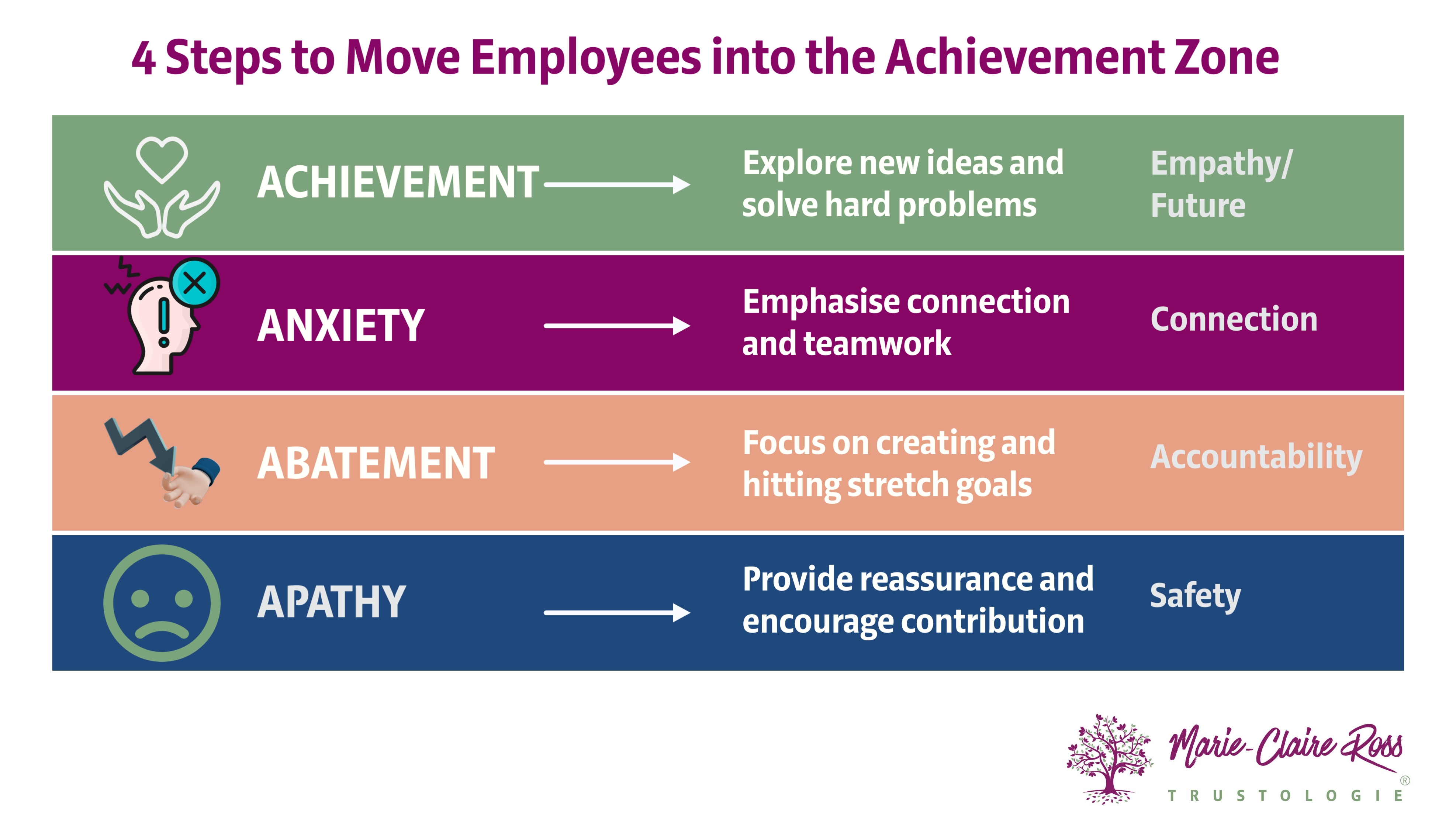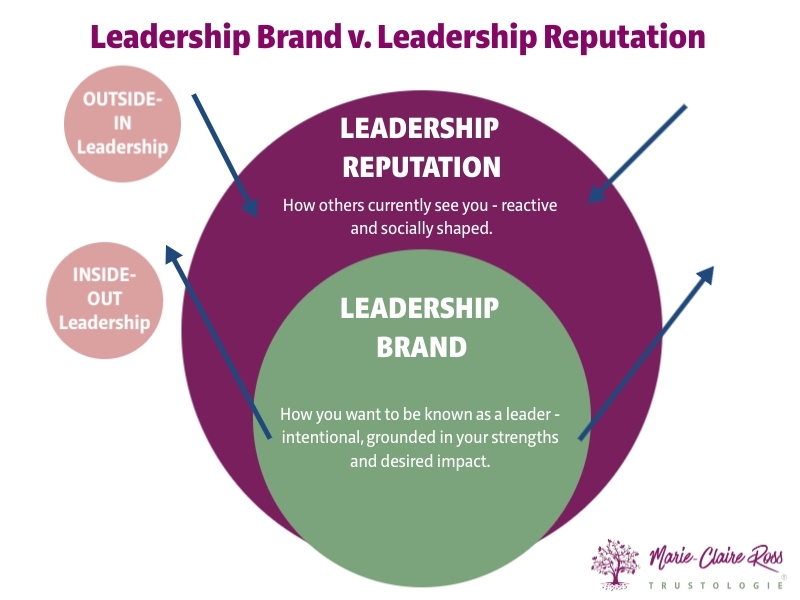13 min read
Is your team vibe feeling off? How to reset your team dynamics
As teams return from their summer (or winter) break, you may notice subtle shifts in your team’s energy. Even if the end of year was positive, a new...
Develop leaders, strengthen executive teams and gain deep insights with assessments designed to accelerate trust and performance.

Transform how your leaders think and perform with keynotes that spark connection, trust and high-performance cultures.

Explore practical tools, thought-leadership and resources to help you build trusted, high-performing teams.

Trustologie® is a leadership development consultancy founded by Marie-Claire Ross, specialising in helping executives and managers build high-trust, high-performing teams.

4 min read
Marie-Claire Ross : Updated on August 14, 2024
In my research with high performers, one of the stand out themes was their confidence in tackling a difficult conversation. While none of them felt one hundred percent comfortable about having to do them, they all believed that it was better for everyone long-term.
Interestingly, they realised that the difficult conversation itself was only part of a continual process. This meant that they scheduled time to prep for the conversation, have it and then follow up afterwards. Understanding that they would have to do that process many times over to turn around performance.
Let's take a look at the six things that high performers have learned to focus on when it comes to tackling tough conversations.

What stops us from having a difficult conversation are thinking traps such as a fear of hurting the other person, coming across as critical or excessive worry about the outcome.
Yet, our fears about having a difficult conversation can pave the way for a terrible result.
Before the discussion, define the purpose and your desired outcome of the conversation.
A good idea is to prepare some talking points. Ideally, they are in dot point format, so that you can easily refer to them. Provide specific examples or evidence to support your statements.
When you plan the conversation also consider the other person's perspective. Put yourself in their shoes to gain empathy and understanding.
It's also a good idea to anticipate potential roadblocks or objections that may arise during the conversation and think about how you can address them.
Effective communication is essential during difficult conversations to ensure that both parties feel heard, understood, and respected. Here are some strategies to enhance communication during conflict:
- Active listening: Give the other person your full attention, maintain eye contact, and listen without interrupting. Show empathy and understanding by summarising their points or asking clarifying questions.
- Use 'I' statements: Express your thoughts and feelings using 'I' statements to avoid sounding accusatory or judgmental. For example, say 'I feel' instead of 'You always' or 'You never'.
- Seek common ground: Look for shared interests or goals to establish common ground and build a foundation for finding solutions together.
- Be solution-oriented: Focus on problem-solving rather than dwelling on the past or assigning blame. Explore alternative options and propose compromises that can lead to a win-win outcome.
- Use non-verbal cues: Pay attention to your body language and non-verbal cues, such as maintaining an open posture, nodding to show understanding, and using appropriate facial expressions.
- Co-create a plan: Summarise the key points discussed to ensure understanding and clarify any misunderstandings or misinterpretations. Get their agreement and make sure there are clear action steps for them to take.
We often put all our energy into the lead up of the big conversation, not realising that the important work is in the follow-up. Where a lot of leaders trip up is they don't put the necessary structure around ensuring their report is improving their performance.
Here are some steps to consider:
- Follow up with actionable steps: Identify the necessary actions or next steps required to resolve any issues or address concerns that arose during the conversation. Keep everyone informed of the progress with regular updates.
- Schedule regular check in points according to what you agreed on during the discussion. This is where you need to start observing a turnaround. Provide more support and be specific about what you need to see and when you know you have the outcome you wanted.
- Reflect on the conversation: View difficult conversations as opportunities for personal and professional growth. Reflect on what you have learned from the experience and apply those learnings to future interactions. What would you do differently next time?
To effectively manage difficult conversations, it is crucial to approach them with empathy, open-mindedness, and a focus on finding a resolution rather than assigning blame. These conversations provide an opportunity for growth, understanding, and strengthening relationships within the workplace.
If your intention is to help people learn and improve, they will feel that. Growing is often uncomfortable and painful. If they decide, to be hurt and ruminate about the feedback, and blame you, that is their issue to work on. You are not responsible for how people take on feedback and react to it. All you can do is provide corrective feedback that is said with kindness and clarity.
And always keep in mind, dedicate most of your time to planning the conversation and diligently following up to guarantee tangible results. By investing effort and time into these steps, not only does the conversation become smoother, but it also becomes progressively easier with each interaction.
If you're seeking guidance on mastering the art of difficult conversations, I offer specialised Difficult Conversation Training to aid you. These workshops are conveniently available both in-person and online for groups of up to 16 people.

13 min read
As teams return from their summer (or winter) break, you may notice subtle shifts in your team’s energy. Even if the end of year was positive, a new...

14 min read
The workplace is evolving at a pace few previous generations have seen and 2026 will mark a turning point. The Future of Work is blended, not hybrid....

5 min read
Many leaders jump into a leadership position excited by the opportunity to help others and perform at a higher level.

One of my darkest times as an entrepreneur was winning the contract to undertake all of the audiovisual requirements at Fashion Week. It involved...

Call it fear of looking stupid or fear of not fitting in right, for some reason we when work in corporate jobs, we speak like, well, robots.
Back when I was a kid in the 1980s, I attended one of my father’s business classes that he taught at a University. As an awkward 12 year old, in a...